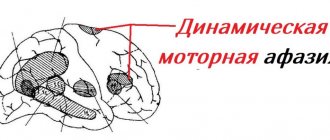Severe speech impairment (SSD) is a group of disorders that includes a range of medical and speech therapy diagnoses. This includes all persistent deviations of the speech system in children with normal hearing development and without primary intellectual impairment.
The criterion for defining a speech disorder as severe is the child’s inability to independently master the standard general education system. This is due to the fact that following speech, verbal memory decreases, logical thinking lags behind, difficulties appear in following oral instructions, motor skills are poorly developed, and motivation is also reduced, but the child experiences self-doubt and irritability. Due to severe speech impairment, the child communicates little in society; he does not have normally formed not only dialogical, but also monological speech. Auditory memory, voluntary attention and memorization productivity are also significantly reduced, although the logic of thinking is formally preserved.
Severe speech disorders, in contrast to general ones, imply a complete absence of verbal communication or its sharp limitation around 4-5 years. It is possible to pronounce individual syllables or sounds, but the child prefers to communicate with gestures. This lag from conversational norms of development becomes most noticeable around the age of 5, when normotypical children are able to pronounce most sounds and use detailed phrases and sentences. The diagnosis of TNR is made by a psychological-medical-pedagogical commission (PMPC) primarily in order to refer the child to a specialized correctional institution. A specific medical diagnosis included in this group can be made much earlier. But experts are inclined to believe that it is not worth waiting for the diagnosis of TNR by the commission; it is better to start any corrective measures as early as possible, as soon as the first difficulties with the child’s speech become noticeable, since the period of complete rehabilitation is long. In some cases, you can only improve the child’s speech, but not bring it back to normal.
Diagnoses related to severe speech disorders
TND is a collective concept where speech disorders include a variety of diagnoses. Depending on the symptoms and etiology, various types of correction are necessary, the success of which largely depends on correct diagnosis.
A child with speech impairment may have:
- alalia - underdevelopment or complete absence of speech associated with a violation of the speech zones of the cerebral cortex (there are expressive and impressive, sensory, motor and sensorimotor);
- dysarthria (all degrees except erased) – incorrect pronunciation of sounds and intonations associated with primary insufficiency of innervation of the speech apparatus (organic damage);
- aphasia;
- logoneurosis (stuttering) – caused by convulsions of the speech apparatus and manifested by a violation of the smoothness and rhythm of speech;
- general underdevelopment of speech (levels 1 and 2 of speech development);
- rhinolalia.
According to some sources, TNR also includes dysphonia, aphonia, tachylalia and bradyllalia.
All of the listed forms of disorders have several degrees of severity, which is manifested during diagnosis and affects further correction. At the most severe stages, the child is recognized as limited in his abilities, and then the question of a socio-legal nature is raised about granting a disability group.
With these diagnoses, it is recommended to transfer the child to a specialized educational institution - a speech therapy garden or to a speech therapy group of a combined type kindergarten, where an appropriate cognitive and correctional program is selected. The main goals of such institutions boil down to speech and cognitive development, as well as the creation of a social and communicative environment for children with disabilities.
Separate classes are conducted on physical education and artistic and aesthetic development as the main elements of overall development. It is important from the moment of diagnosis to regularly visit specialists to monitor the dynamics and timely correction of the rehabilitation program. Depending on the type of disorder and its severity, the child may be registered with several specialists at the same time: a neurologist, speech therapist, child psychologist, defectologist.
Reasons for appearance
A child with speech defects is observed by doctors of various specialties: psychologists, speech therapists, neurologists, defectologists. Its functions can be influenced by both internal and external factors. Even during the development of the embryo, oxygen deficiency, severe toxicosis, and injuries during labor can have a negative impact. Bad habits of the mother, diseases of the endocrine system and certain medications can also affect the child’s articulatory apparatus. Speech dysfunctions sometimes occur under the influence of a hereditary factor.
If parents are overly active in raising their child, he does not feel the need to voice requests and maintain dialogue. They will give and bring everything to him anyway. In the opposite situation, the baby simply withdraws within himself when no attention is paid to his speech.
Insufficient development of the muscles of the articulatory apparatus is also associated with the nature of the baby’s nutrition. You cannot replace all vegetables and fruits with mashed potatoes from jars and your own preparation; the child must learn to chew.
Children who have had encephalitis and infectious diseases before one year of age are relatively at risk. Parents need to prevent concussions and other traumatic brain injuries. The external environment and poor microclimate in the family also affect the baby’s speech. Disruption of speech functions is more often observed at 1-2 years of age, when registering in a preschool educational institution or before school at 6-7 years of age.
Correction of severe speech disorders
Correction of TNR is always lengthy and often requires the participation of a team of specialists. Since many diagnoses are associated with organic lesions, medical support (psychiatrist, neurologist, therapist, pediatrician) is necessary. In addition, regular classes with specialists with pedagogical and psychological education are necessary. To remove psychological blocks, a child psychologist is needed. The speech therapist deals directly with the correction of pronunciation, the defectologist helps in the development of thinking and memory.
The forecast for improvement depends on the consistency and regularity of classes. When a child misses several lessons in a row, the accumulated skills are lost, and specialists have to start all over again.
The difficulty of rehabilitation also lies in the fact that an individual work program is drawn up for each child, including all his characteristics. This includes:
- speech therapy exercises to correct the underlying disorder;
- speech therapy massage and articulation gymnastics;
- development of higher mental activity and motor skills;
- improvement of psycho-emotional state and social adaptation.
The optimal age to start classes is 3 years. It is during this period that it is possible to level out the delay in speech development and avoid making one of the diagnoses of the psychoneurological field.
Not every violation can be corrected; it all depends on the situation and the severity of the violation. Cases with organic lesions of the cortex and innervation apparatus require longer and more serious correction. And logoneurosis caused by psychotrauma initially has a more favorable prognosis.
The role of parents is also important, as they need to be actively involved in all stages of the child’s development. It is important to ensure strict adherence to the daily routine and maintenance of a calm atmosphere in the family, since the emotional-volitional sphere of the child is not sufficiently developed.
Ember Center specialists provide assistance to children with severe speech impairments at any stage. During the consultation, defectologists and psychologists give recommendations regarding changing the model of interaction with the child, which helps improve mutual understanding and make it easier to complete homework. For example, we use additional visual materials (cards, toys) to improve the perception of verbal information.
Severe speech disorders require daily attention to detail, constant remedial training and close cooperation of all specialists and parents.
For successful correction of TNR, it is important that parent-child relationships are harmonious. If parents experience a feeling of guilt and increased anxiety, this can lead to overprotection of the child and inhibit the correction of his condition. In this case, it is recommended to work through emotions and fears with a family psychologist.
Our center has all the conditions for successful correction of severe speech disorders.
Author of the article: speech therapist O.I. Fedotova
Classification by type
TNR in speech therapy for preschool children is classified according to clinical symptoms and psychological and pedagogical characteristics. Speech disorders according to biological manifestations are divided into the following groups:
- voice (dysphonia and aphonia);
- pathologies of tempo (tachylalia and bradylalia);
- problems with reading and writing;
- sound (dysarthria and stuttering).
The method for correcting the disorder is selected in accordance with these characteristics. The pedagogical classification divides TNR into two groups. The first includes general, phonetic and phonemic developmental deviations. The second is stuttering. This formulation also allows the speech therapist to create a treatment plan for the child.
The baby begins to learn the basics of vocabulary and grammar at the age of 1.5-3 years. After the preschool stage, his speech is shaped by his immediate environment, which largely depends on the culture and upbringing of adults. Its violations may concern the pronunciation of sounds, phonemic perception, vocabulary size, and the ability to compose sentences correctly. Speech disorders are expressed in sound defects, insufficient vocabulary, problems with phonemic hearing, and inability to compose sentences. There are four types of OHP:
- Level I is the most critical, a 4-5 year old child is not able to communicate verbally. His speech function consists of a set of sounds, while he can actively gesticulate.
- II degree - despite the presence of distorted words and similar grammatical forms, the speech is difficult for others to understand. Characterized by a significant deviation from the age norm.
- Level III – there is an extended form of speech using phrases; children can maintain a dialogue. However, compared to their peers, they do not speak fluently.
- Level IV – there are grammatical errors in sentences, violation of the pronunciation of individual letters.
If parents are deaf, pronunciation defects are inevitable.
Problems in teaching children with SLI in schools
With this diagnosis, students tend to slow down the perception of information. Their performance is at a reduced level. Associative connections between auditory, visual and speech abilities are disrupted. There are difficulties in organizing voluntary activities. Also, when deciphering the diagnosis of TNR, memory deterioration and deviations in spatial orientation are manifested. Students have poor self-control. Impairments in fine motor skills, visual and auditory coordination are noticeable.
Expert opinion
Margarita Sergeevna S.
Speech pathologist and speech pathologist with 15 years of experience working in various speech correction centers with children of different ages.
Due to problems with speech, difficulties in understanding and mastering material in the Russian language appear. As a result, difficulties arise with writing.
If a child is unable to master educational material, his motivation to overcome obstacles decreases. Children with SLD have decreased self-esteem and decreased desire for further education. All this leads to an inability to adapt to the school environment.
If qualified speech therapy and medical and psychological assistance are not provided, children will not be able to receive quality education.
Signs and symptoms
Speech abnormalities can be expressed by one or more symptoms. Based on their combination, a final diagnosis is made. A child with SLD does not perceive educational material well and lags behind his peers in intelligence. Due to impaired motor skills, he looks clumsy, his mental state is unstable (impulsivity is replaced by isolation). Irritation over small things leads to difficulties in communicating with peers.
Correction of the defect is necessary because dysfunction of the speech apparatus leads to phonetic, grammatical and lexical disorders. In addition to problems with thought processes, the child has difficulties communicating with others. When children use amorphous root words (“you bang” - the cup fell), simple phrasal speech, and agrammatic statements, their meaning is not clear to an outsider.
Intelligence suffers secondary to severe speech deficiency. Children cannot concentrate on new material and have difficulty switching from one topic to another. The topic studied is quickly forgotten, especially those related to the plot and sequence of events. Often they do not know how to generalize and draw conclusions. It is easier for them to work with visual material. The existing movement disorder leads to rapid general fatigue and decreased tone. All of the above signs cause deviations in the emotional-volitional sphere. Children with SLD are characterized by passivity, resentment and lack of motivation to achieve results.
Deviation from the normal rate of speech is also a pathology. A child with such defects may speak in phrases from cartoons or those he heard from his parents the day before. Due to difficulty chewing food, he may choke on even a small piece. You should also pay attention to such symptoms as a constantly open mouth and increased salivation.
What are the dangers of TV and modern gadgets? An uncontrolled flow of information enters the brain, while the baby does not puzzle himself with mental activity.
Education of children with SLD in kindergartens
Children diagnosed with SLD are able to study in specialized preschool institutions or in regular kindergartens, where a speech therapist works. Such an institution is obliged to develop an AOEP (adapted basic general education program) for children with special needs in preschool educational institutions. Such a program is created individually in
every kindergarten.
In such a development, aspects of the psychophysical and speech development of each individual child should be considered. It takes into account the child’s capabilities, a plan for his correction and adaptation in the social sphere. This means that the kindergarten applies the state program for children with SLD, but at the same time makes adjustments taking into account the personality characteristics of each child. Approval of such a document is carried out by the manager and the management council.
Each preschool institution can operate several such directives at once. Mandatory items must be:
- system for assessing children's successes and achievements;
- a list of items and actions to achieve your goals;
- developed extracurricular development program;
- expected results and results of the work performed.
Important: it is advisable to send children with SLD to a preschool institution where similar children have previously studied. Educators and teachers already have considerable experience in communicating with such children. It will be much easier for them to find a common language with the child.
It will also be useful for such children to be in society with ordinary children. They will be able to learn a lot and will not feel isolated from society.
Don't miss: How to identify and correct dysarthria?




